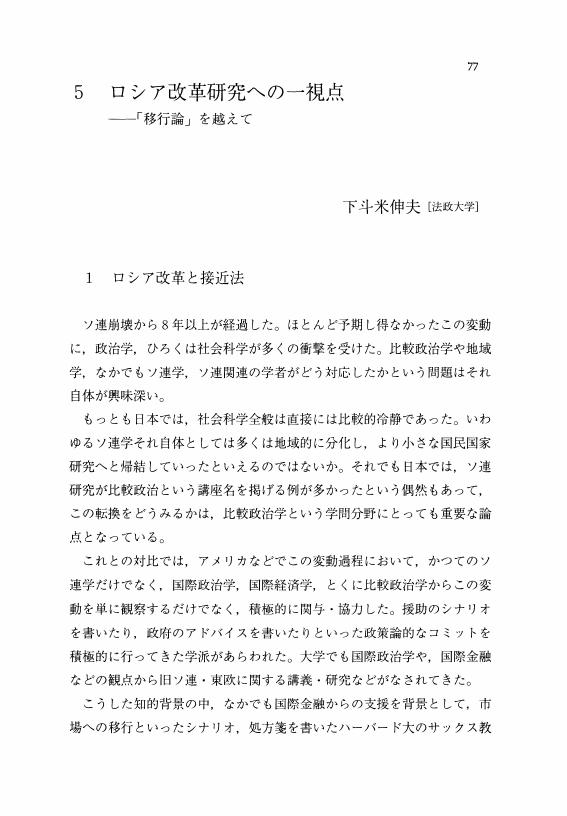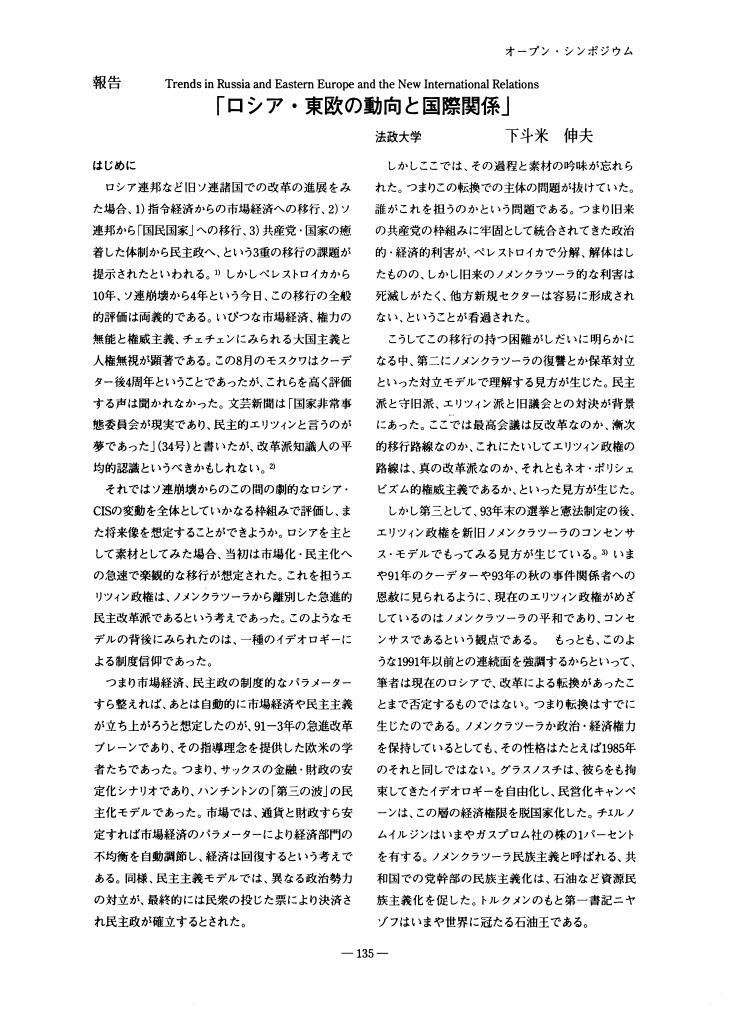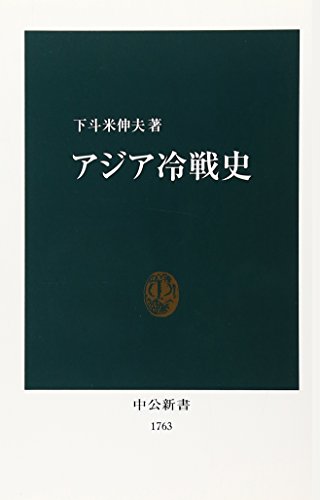4 0 0 0 OA ウクライナをめぐるロシアの政治エリート(1992–2014)
- 著者
- 下斗米 伸夫
- 出版者
- ロシア・東欧学会
- 雑誌
- ロシア・東欧研究 (ISSN:13486497)
- 巻号頁・発行日
- vol.2014, no.43, pp.21-42, 2014 (Released:2016-09-09)
- 参考文献数
- 41
This essay traces on the evolvements of Russian political class over the issue of Ukraine from the demise of the USSR to 2014 crisis, culminating in the annexation of the Crimea peninsula. Russian attitudes towards the rebirth of Ukraine nationalism were ambiguous, especially among elite level. The August coup against the Soviet President Mikhail Gorbachev took place in Ukraine, where its nationalistic elements were independent oriented, while the conservatives, including the military industrial complex were negative. After the December 1991 referendum, where opinions were in favor for independence, Leonid Kravchuk, once ideological secretary of the Ukraine communist party could rely on the support of the West oriented voice of western Ukraine, where European and Catholic influence was vocal. From the Russian point of view, this region was alien from the Orthodox tradition and was never been part of the Russian Empire. Thus, Ukraine as the nation state was weak and far from united as political identity was concerned. Economy was also divided between agrarian west and the east, where Soviet type of military industrial complex was dominant. This east-west divide caused political instability in Ukraine, that was revealed when Kravchuk was replaced by Kuchima who first relied on the support of Russian speaking east, though he eventually turned to the west. Moscow was particularly concerned the fate of the Black Sea fleet and Crimea, where Russians were dominant and never belonged to Ukraine until 1954, when Nikita Khrushchev, Ukrainian oriented Soviet leader changed the status of Crimea from Russia to Ukraine. Though Russian President Boris Yel’tsin was in favor for the Ukraine status quo, his nationalistic minded semi-oppositionists like Moscow Mayor Luzhkov were against the Ukraine position overt the fleet and Crimea. It was only pragmatism of Yevgeny Primakov, Foreign Minister, who could pass the bill on the partnership in 1997. New President Vladimir Putin was more oriented Russian nationalism, and was particularly against the color revolution, when western oriented President Yushchenko won over the East oriented Yanukovich in a 2004 election. East-West divide, coupled with the corruption and ungovernavility, became Kremlins worry on Ukraine. Still they succeeded in winning Yanukovich victory in the following election and could deal over the 25 years continuation of the Black Sea Fleet, in turn for cheaper gas supply in 2010. Ukraine thus became a grand over which domestic East-West divide was coupled by the influence of the NATO-EU and Moscow contested. The Maidan revolution was thus seen from Kremlins nationalists oriented policy makers to be an attempt to cut the influence of Russia over Ukraine. The Izborskii club or another religious-Orthodox oriented politicians were thus backing sudden policy changes of the President Putin, who took Maidan revolution as another attempt of regime change by the West, and eventually annexed the Crimea Peninsula. Thus, in turn, brought about the civil war situation, particularly in the east Ukraine, that was already uncontrolled by neither Moscow nor Kiev authority.
3 0 0 0 OA 越境と変容―グローバル化時代におけるスラヴ・ユーラシア研究の超域的枠組みを求めて
- 著者
- 沼野 充義 三谷 惠子 松里 公孝 柳原 孝敦 青島 陽子 小松 久男 乗松 亨平 楯岡 求美 井上 まどか 亀田 真澄 下斗米 伸夫 坂庭 淳史 池田 嘉郎 湯浅 剛 阿部 賢一 安達 祐子 加藤 有子 平野 恵美子 羽場 久美子 柴田 元幸
- 出版者
- 東京大学
- 雑誌
- 基盤研究(A)
- 巻号頁・発行日
- 2013-04-01
ソ連解体後のスラヴ・ユーラシアの変容と越境の様々な様相に焦点を合わせた包括的な研究である。グローバル化時代の世界情勢を考慮に入れ、新たな研究の枠組みの構築を目指した。代表者および19名の分担者の専門は、地域的にはロシア、ウクライナ・コーカサス・中央アジア、中・東欧から、東アジアや南北アメリカに及び、分野も文学・言語・芸術・思想・宗教・歴史から政治・経済・国際関係に至るまで人文社会科学全体にわたる。このようなグループによる超域的・学際的アプローチを通じて、国際学会の組織に積極的に関わり、日本のスラヴ・ユーラシア研究の国際的発信力を高めるとともに、この分野における国際交流の活性化に努めた。
3 0 0 0 OA 中ソ対立と金日成(一九五六年─一九七二年) : ロシア外交史料を中心に
- 著者
- 下斗米 伸夫
- 出版者
- 法学志林協会
- 雑誌
- 法学志林 = Review of law and political sciences (ISSN:03872874)
- 巻号頁・発行日
- vol.116, no.2・3, pp.141-176, 2019-02-22
2 0 0 0 OA スターリン批判の「地政学」 (1)
- 著者
- 下斗米 伸夫
- 出版者
- ロシア・東欧学会
- 雑誌
- ロシア・東欧研究 (ISSN:13486497)
- 巻号頁・発行日
- vol.2006, no.35, pp.3-12, 2006 (Released:2010-05-31)
In this essay, the present author researched the impact of the criticism of the‘Cult of Stalin, ’in the context of its implication on global socialist regimes. Above all, its impact over Asian socialist countries are analyzed. Special attention is paid on the Chinese communist party and DPRK. Emphasis is put on the fact that Hungarian and other East European revolution have un precedent impact over the fragile democratization in Asia. Kim IL Sung could perpetuate its ‘Cult of Chuch'e, ’because Moscow had to concentrate on Eastern socialism.
2 0 0 0 OA ロシア改革の循環―利益分化と政治統合
- 著者
- 下斗米 伸夫
- 出版者
- ロシア・東欧学会
- 雑誌
- ロシア・東欧学会年報 (ISSN:21854645)
- 巻号頁・発行日
- vol.1997, no.26, pp.1-9, 1997 (Released:2010-05-31)
- 参考文献数
- 26
2 0 0 0 OA 私のソビエト・ロシア研究
- 著者
- 下斗米 伸夫
- 出版者
- 法学志林協会
- 雑誌
- 法学志林 = Review of law and political sciences (ISSN:03872874)
- 巻号頁・発行日
- vol.117, no.3・4, pp.69-85, 2020-03-24
1 0 0 0 OA モスクワ外相会議(1945年一二月)再考(上)日本占領、核開発、および冷戦の起源
- 著者
- 下斗米 伸夫
- 出版者
- 法学志林協会
- 雑誌
- 法学志林 = 法学志林 (ISSN:03872874)
- 巻号頁・発行日
- vol.102, no.2, pp.37-65, 2005-01-21
1 0 0 0 OA 5 ロシア改革研究への一視点 ―「移行論」を越えて
- 著者
- 下斗米 伸夫
- 出版者
- 日本比較政治学会
- 雑誌
- 日本比較政治学会年報 (ISSN:21852626)
- 巻号頁・発行日
- vol.1, pp.77-95, 1999-06-25 (Released:2010-09-09)
- 参考文献数
- 24
- 著者
- 下斗米 伸夫
- 出版者
- ロシア・東欧学会
- 雑誌
- ロシア・東欧研究 (ISSN:13486497)
- 巻号頁・発行日
- vol.2017, no.46, pp.5-6, 2017 (Released:2019-02-01)
1 0 0 0 OA プーチン後を模索するロシア?
- 著者
- 下斗米 伸夫
- 出版者
- ロシア・東欧学会
- 雑誌
- ロシア・東欧研究 (ISSN:13486497)
- 巻号頁・発行日
- vol.2005, no.34, pp.14-25, 2005 (Released:2010-05-31)
The aim of this essay is to investigate the political evolution of Putinism following the March 2004 presidential election and its aftermath. By 2003 Putin has evolved as unique political figure eliminating the remnants of Boris Yeltsin, by arresting a politicized oligarch, Boris Khodorkovskii and ousting Premier Minister Mikhail Kasyanov. His second tenure, however, turned out to be backlashed. The Beslan tragedy, orange revolution in Ukraine and others gave negative image of the second term Putin Presidency. By 2005, however, things seem to be normalized partly because of high energy prices. Property of oil and energy related company was redistributed among ‘Siloviki’ generals and the state. In Russia property was not totally independent from the power. In this political landscape, future of Putinism is discussed by the middle of 2005, whether he is going to change the game of presidential election, or he will appoint his successor.
1 0 0 0 OA 「ロシア・東欧の動向と国際関係」
- 著者
- 下斗米 伸夫
- 出版者
- ロシア・東欧学会
- 雑誌
- ロシア・東欧学会年報 (ISSN:21854645)
- 巻号頁・発行日
- vol.1995, no.24, pp.135-143, 1995 (Released:2010-05-31)
- 参考文献数
- 5
1 0 0 0 OA 「ポスト・プーチンのロシアの展望」(平成30年度 ロシア研究会)
1 0 0 0 E・H・カーの著作をめぐって
1 0 0 0 私のソビエト・ロシア研究 (下斗米伸夫教授定年退職記念号)
- 著者
- 下斗米 伸夫
- 出版者
- 法政大学法學志林協會
- 雑誌
- 法學志林 = Review of law and political sciences (ISSN:03872874)
- 巻号頁・発行日
- vol.117, no.3, pp.69-85, 2020-03
- 著者
- 下斗米 伸夫
- 出版者
- 法政大学法學志林協會
- 雑誌
- 法學志林 = Review of law and political sciences (ISSN:03872874)
- 巻号頁・発行日
- vol.117, no.3, pp.87-119, 2020-03
1 0 0 0 OA 第1セッションコメント
- 著者
- 下斗米 伸夫
- 出版者
- Toyo Bunko
- 雑誌
- Modern Asian Studies Review / 新たなアジア研究に向けて = Modern Asian Studies Review / 新たなアジア研究に向けて (ISSN:18807305)
- 巻号頁・発行日
- vol.8, pp.100-101, 2017-03
- 著者
- 下斗米 伸夫
- 出版者
- 法政大学法學志林協會
- 雑誌
- 法學志林 = Review of law and political sciences (ISSN:03872874)
- 巻号頁・発行日
- vol.114, no.3, pp.219-267, 2017-03
- 著者
- 下斗米 伸夫
- 出版者
- 法学志林協会
- 雑誌
- 法學志林 = Review of law and political sciences (ISSN:03872874)
- 巻号頁・発行日
- vol.114, no.3, pp.219-267, 2017-03
1 0 0 0 労働組合論争・再論 : 古儀式派とソビエト体制の角度から(前半)
- 著者
- 下斗米 伸夫
- 出版者
- 法政大学法學志林協會
- 雑誌
- 法學志林 (ISSN:03872874)
- 巻号頁・発行日
- vol.114, no.1, pp.1-52, 2016-10




